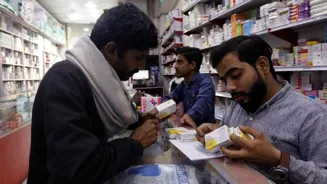From small-town corners to urban high-rises, medical shops have become an essential part of the retail landscape. The growing demand for medicines, driven by population growth, increased health awareness,
and changing lifestyles, has turned pharmacy stores into one of the country’s most dependable businesses. But while the business is lucrative and respected, it’s not open to just anyone with capital.
Running a pharmacy is not like opening a grocery store. It directly impacts people’s health, and for that reason, the government maintains strict entry barriers. Simply having money in hand won’t get you past the regulatory gate. Specific qualifications, licenses, and professional oversight are non-negotiable.
Pharmacy Degree Is Mandatory
The minimum qualification to open a medical shop is either a Diploma in Pharmacy (D.Pharm) or a Bachelor in Pharmacy (B.Pharm) from an institute recognised by the Pharmacy Council of India (PCI). Without one of these credentials, a drug licence will not be issued.
Those without a pharmacy degree can still run a shop, by hiring a registered pharmacist. However, this isn’t a loophole to bypass the rules. The pharmacist must be physically present at the shop during business hours and must be registered with the State Pharmacy Council.
Capital Requirements
The cost of setting up a medical store varies dramatically depending on the location, size, and nature of the business.
In smaller towns or semi-urban areas, setting up a basic store measuring 100–200 sq ft may require an initial investment of Rs 3–5 lakh. This includes rent, interiors, air conditioning, a refrigerator, a basic computer system with billing software, and a starter inventory of medicines.
In metro cities like Delhi, Mumbai, Bengaluru, or Gurugram, costs can escalate sharply. For a well-branded pharmacy in a Tier 1 or Tier 2 city, the starting budget ranges from Rs 8–15 lakh or more. Ongoing expenses such as rent, electricity, staff salaries, and marketing must also be factored in.
Some entrepreneurs opt for franchise models like Apollo Pharmacy, MedPlus, or Netmeds, which offer supply chain support and brand recognition but come with their own costs, primarily the franchise fee and mandatory revenue sharing.
One Licence, One Store
A drug licence issued by authorities is valid for only one pharmacy. Each new outlet must have a separate licence and a registered pharmacist to operate legally.
Running multiple stores on a single licence, a practice some try to adopt, is illegal and can lead to hefty penalties or licence cancellation by drug inspectors. For anyone looking to expand into a pharmacy chain, the regulatory framework requires full compliance for each location.
Opening a medical store can be a stable and respectable business opportunity, but it comes with responsibilities. You need either the right qualifications or a qualified partner, an approved license, and a clear understanding of the legal framework.















